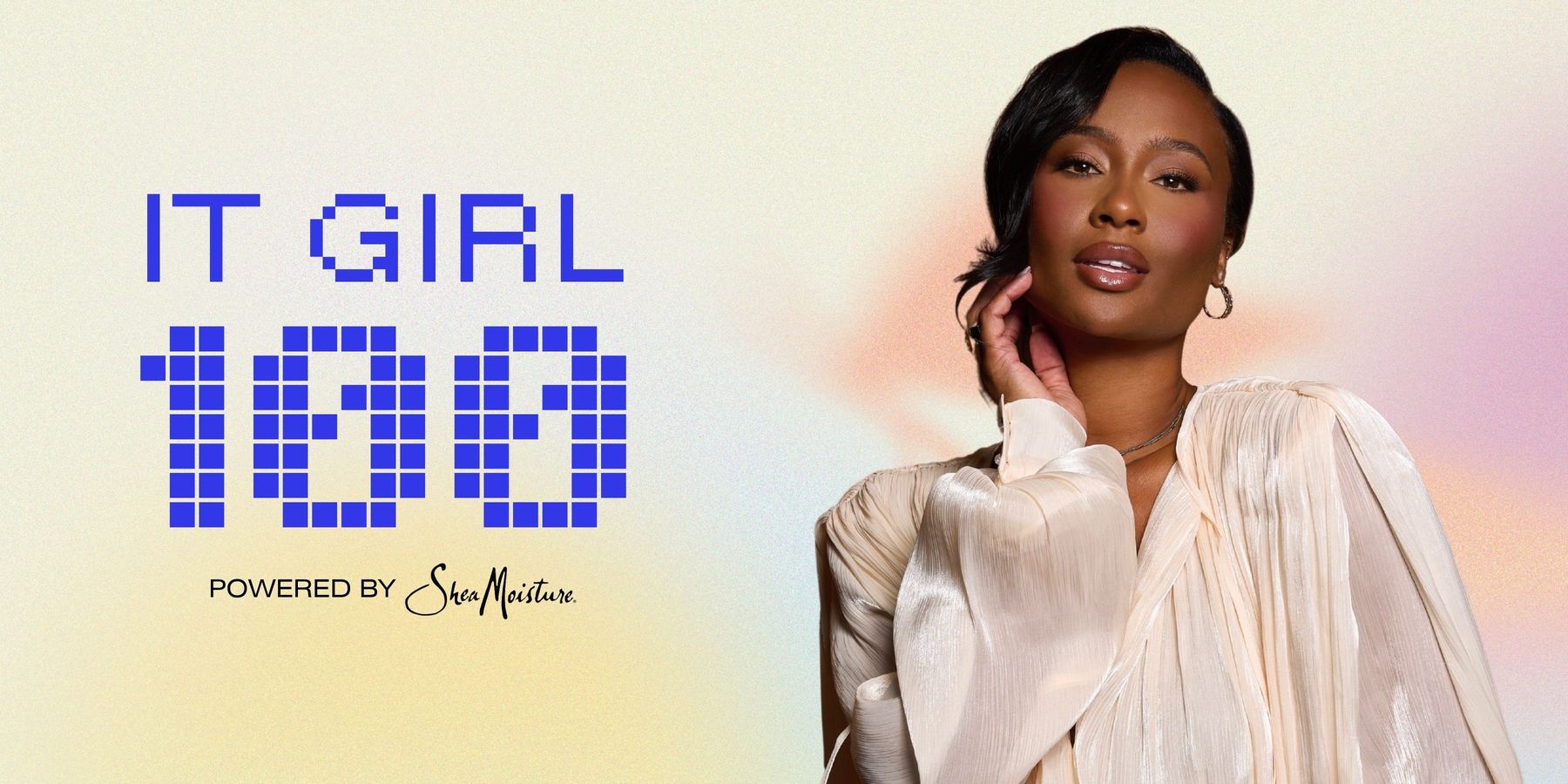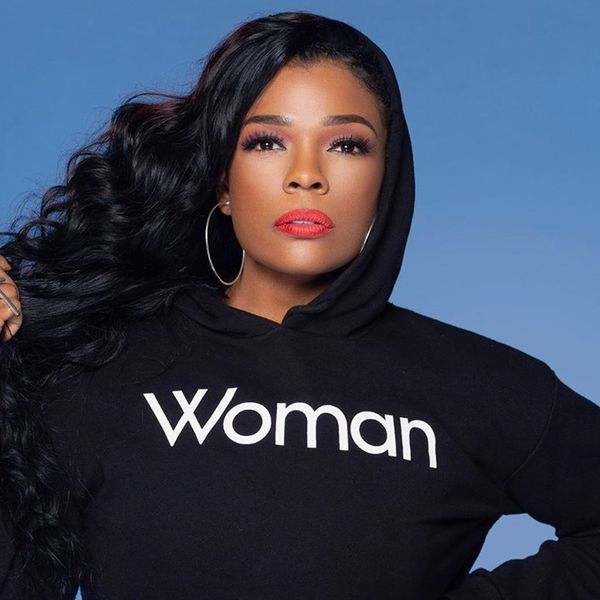
Syleena Johnson's greatest instrument is her voice and has recognized her passion for music since her earliest childhood memories. With a father who was in the entertainment industry as a singer, music was part of her life from an early age and eventually blossomed into her participating in talent shows and showing the world what she was meant to do. "I just finished filming my UNSUNG episode which will premiere on TVOne early 2021 and that will tell the readers a lot about my story and how I began. I am excited for you to see it. It will show you how I got my start in the industry and how I got to where I am now," she spilled to xoNecole about her upcoming project.
As a singer, she has used her voice and songs to uplift women and Black people, but now as a talk show host on Cocktails and Queens on Fox Soul, Syleena is using her voice to empower Black women to demand respect and equality on the other side of the couch. "I am still and will always be a part of music," the former Sister Circle host told me about her transition into being a talk show host, "However, opportunities and God have allowed me to become a talk show host and share my opinions and thoughts as a woman in this world and in entertainment."
Nowadays in her career, Syleena can apply the multitude of lenses to her craft from the talent side to research and development as the interviewer. When she's not on the couch interviewing talent or in the booth making new empowerment anthems, the "Guess What" singer has been working on her latest docuseries project, The Making of a Woman, which was heavily inspired by her recently released Woman album.

Courtesy of Tony Tyus Photography
"This docuseries will show what my experience as a Black woman has been in this industry for over 20 years as well as being a working-class woman, a wife and a mother raising two sons. It will inspire people to see the challenges Black women face on a day-to-day basis and how we overcome it," she explained. "I wanted to show a message and present that in a body of work to create more of a conversation and a call-to-action. I've realized in order to make change, we must create content or use our voice to make a shift in change in our society."
xoNecole had the opportunity to catch up with the Grammy-nominated singer herself about using her voice to uplift women, her new docuseries The Making of a Woman, and being a Black woman in 2020 demanding equal rights in our current racial climate. Check out our conversation below.
xoNecole: Tell me about your docuseries, 'The Making Of A Woman', the messaging and the inspiration behind it.
Syleena Johnson: The docuseries The Making of a Woman is heavily inspired by my recent album, Woman. Each of my albums as a solo artist have been titled after chapters, however with today's racial climate I decided to create the album and docuseries to speak on the struggles and experiences of everyday Black women and what we go through in life in 2020. I created this docuseries to vocally create a body of work that documented the journey of what it took to create this album, mentally, internally and spiritually while sharing the experiences of what women go through like demanding equality and respect, having a voice to even having to work twice as hard as our male counterparts even through pain and adversity.
How does your new studio album, ‘Woman’, directly correlate with the story that you're telling us in the docuseries?
It's my journey, my thoughts and what I and many women endure as a Black woman in society as well as this industry. You'll see me on my journey of completing my album and shooting the video to my lead single off my new album. You'll see the vision that I had to want to highlight how beautiful and special women are. The docuseries speaks on dishonesty, respect and the many examples of inequality Black women face while showing the process of creating a body of work that shares the same message.
How are both releases timely considering our current racial climate?
Right now, we are in the year of the WOMAN. We have a Black woman that is working tirelessly to be the next Vice President of the United States. Black women are on the front lines organizing, protesting and leading the forefront of creating change for our economy and the futures of our next generation. Considering our current climate, both releases vocally tells a story that we still have work to do and are still fighting for respect in 2020. With both releases of my album and docuseries, I wanted to use what I've been seeing in situations like the #MeToo and Time's Up movement, and use my voice and passion in music to be a vessel for other women's stories and journeys.
What do you define as the makings of a woman?
The makings of a woman is the willingness of a woman to grow despite her flaws, despite her mistakes, despite her circumstances and her setbacks in life. The ingredients of the makings of a woman is built up of all the little experiences that you had and how you've handled them and most importantly learned from them. These are the certain experiences you must endure in life to come into your womanhood while helping you grow as a woman.
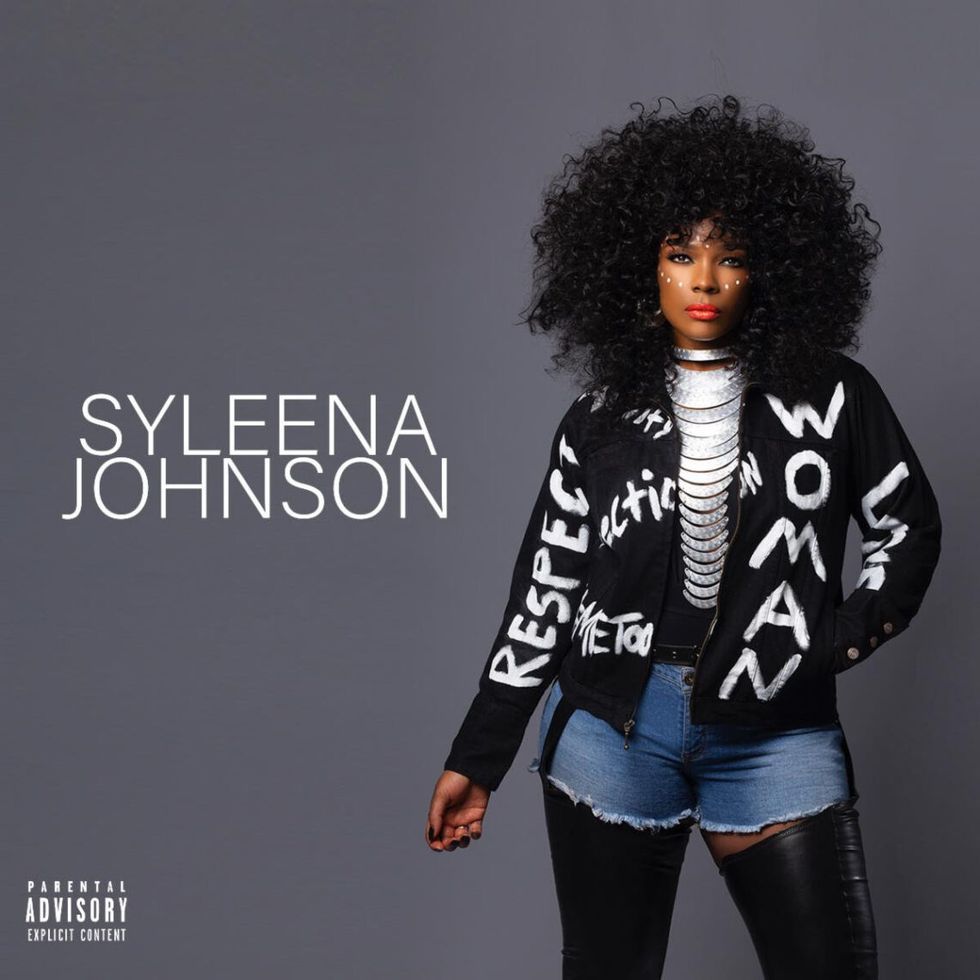
Courtesy of Tony Tyus Photography
"The makings of a woman is the willingness of a woman to grow despite her flaws, despite her mistakes, despite her circumstances and her setbacks in life. The ingredients of the makings of a woman is built up of all the little experiences that you had and how you've handled them and most importantly learned from them."
When do you feel the most "womanly" or the most beautiful as a woman?
I feel the most womanly when I am being a mother to my sons, when I am being a wife. Always working or in business mode does not make me feel like a woman, it makes me tired. I feel more womanly when I can have peace, when I can have "girl time" for myself. I feel the "womanliest" when I can be appreciated and when I am treated like a woman. I feel womanly when I can be heard and valued. More than anything, I feel the "womanliest" when I can operate as a mom and wife without having to be the authoritative figure. When you are a CEO and an entrepreneur you are the authoritative figure but when I come into my household I can relax without having to be the authoritative figure all the time because I have support.
"I feel the most womanly when I am being a mother to my sons, when I am being a wife. Always working or in business mode does not make me feel like a woman, it makes me tired. I feel more womanly when I can have peace, when I can have 'girl time' for myself. I feel the 'womanliest' when I can be appreciated and when I am treated like a woman. I feel womanly when I can be heard and valued."
What is the moment in your life when you believed that you were coming into your own as a woman?
That moment for me was when I got the diagnosis that my youngest son had autism. I developed a level of selflessness that had to take place mentally and emotionally in order for me to grow as a woman. Something like that is supposed to take me out of here and it did, however what that diagnosis did was made me come into my womanhood, turn up my senses as a mother, as a provider. I had to turn up those senses and it made me develop my own personal internal growth spurt. This has allowed me to grow into my womanhood and has taught me to be more patient overall in life. That moment and many life lessons made me understand and be OK with me, unapologetically. It allowed me to love me for who I am and become appreciative of being OK with not being perfect.
There are a lot of conversations around gender and sex. What do you see is the difference between femininity and womanhood, if there is one at all?
What I've learned throughout my own experiences in life is that femininity is a characteristic. Womanhood is a state of mind. Whereas a woman doesn't have to be any of those feminine qualities, and still be a boss, knowing who she is, having a voice, understanding her worth - those are the things that encompass womanhood. Femininity is a characteristic, an accessory. Anyone can be feminine, however it is a characteristic that is interchangeable, whereas womanhood is a growth process, state of mind. A state of being.
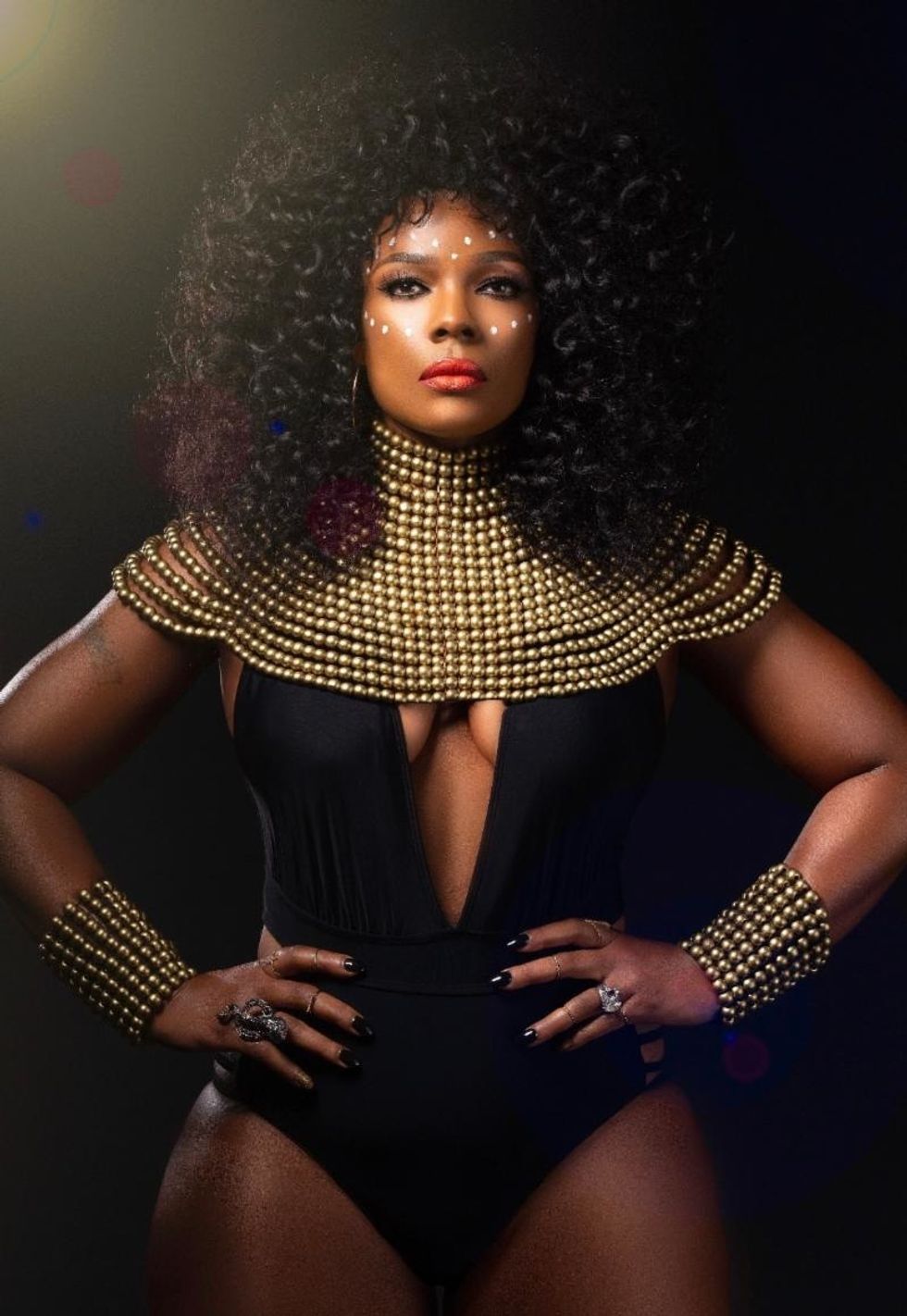
Courtesy of Tony Tyus Photography
"What I've learned throughout my own experiences in life is that femininity is a characteristic. Womanhood is a state of mind. Femininity is a characteristic, an accessory. Anyone can be feminine, however it is a characteristic that is interchangeable, whereas womanhood is a growth process, state of mind. A state of being."
For Black womanhood, what do you believe makes Black women the most powerful and most majestic?
Resilience, our humility, our hearts have made us majestic. The fact that we've endured so much from the test of times has made us extremely powerful and majestic. We are resilient, durable, sustainable. We are smart, we are vociferous, brilliant, studious, meticulous, but we are kind, careful, and multi-layered.
How would you say that you've grown as a singer-songwriter since you first started in the music industry?
I have grown tremendously since coming into the industry and my writing has grown and evolved. I have a different and new sound. I've grown as a woman so I can't stay in the same frame of mind as my other albums. When you're saying different things, you have to stretch out and grow. And that's where I've improved as an artist and singer since first being introduced in the industry.
Being a Black woman in the industry is tough, especially when you're in the spotlight as an artist. How do you manage your mental health and how can the music industry do a better job at protecting Black women?
I manage my mental health by working out and doing stress reduction activities. I am really into fitness and bodybuilding. It allows me to be focused and gain mental clarity. I am also an advocate and use therapy as an outlet to manage my mental health. I have recently embarked on a fitness journey where I competed in a fitness bodybuilding competition which totally improved and helped with my mental health. I was able to not only transform physically losing over 55 pounds but was also able to grow internally within the process.
The music industry can do a better job protecting Black women. The most important thing they can do is listen to Black women. We are not objects. We are not possessions. Listen to Black women and see how they feel, ask are you being heard and valued? Are you being treated fairly? That is how you can protect Black women by listening and valuing us.
If you listen, you learn.
For more of Syleena, follow her on Instagram.
Featured image courtesy of Tony Tyus Photography
Exclusive: Viral It Girl Kayla Nicole Is Reclaiming The Mic—And The Narrative
It’s nice to have a podcast when you’re constantly trending online. One week after setting timelines ablaze on Halloween, Kayla Nicole released an episode of her Dear Media pop culture podcast, The Pre-Game, where she took listeners behind the scenes of her viral costume.
The 34-year-old had been torn between dressing up as Beyoncé or Toni Braxton, she says in the episode. She couldn’t decide which version of Bey she’d be, though. Two days before the holiday, she locked in her choice, filming a short recreation of Braxton’s “He Wasn’t Man Enough for Me” music video that has since garnered nearly 6.5M views on TikTok.
Kayla Nicole says she wore a dress that was once worn by Braxton herself for the Halloween costume. “It’s not a secret Toni is more on the petite side. I’m obsessed with all 5’2” of her,” she tells xoNecole via email. “But I’m 5’10'' and not missing any meals, honey, so to my surprise, when I got the dress and it actually fit, I knew it was destiny.”
The episode was the perfect way for the multihyphenate to take control of her own narrative. By addressing the viral moment on her own platform, she was able to stir the conversation and keep the focus on her adoration for Braxton, an artist she says she grew up listening to and who still makes her most-played playlist every year. Elsewhere, she likely would’ve received questions about whether or not the costume was a subliminal aimed at her ex-boyfriend and his pop star fiancée. “I think that people will try to project their own narratives, right?” she said, hinting at this in the episode. “But, for me personally – I think it’s very important to say this in this moment – I’m not in the business of tearing other women down. I’m in the business of celebrating them.”
Kayla Nicole is among xoNecole’s It Girl 100 Class of 2025, powered by SheaMoisture, recognized in the Viral Voices category for her work in media and the trends she sets on our timelines, all while prioritizing her own mental and physical health. As she puts it: “Yes, I’m curating conversations on my podcast The Pre-Game, and cultivating community with my wellness brand Tribe Therepē.”
Despite being the frequent topic of conversation online, Kayla Nicole says she’s learning to take advantage of her growing social media platform without becoming consumed by it. “I refuse to let the internet consume me. It’s supposed to be a resource and tool for connection, so if it becomes anything beyond that I will log out,” she says.
On The Pre-Game, which launched earlier this year, she has positioned herself as listeners “homegirl.” “There’s definitely a delicate dance between being genuine and oversharing, and I’ve had to learn that the hard way. Now I share from a place of reflection, not reaction,” she says. “If it can help someone feel seen or less alone, I’ll talk about it within reason. But I’ve certainly learned to protect parts of my life that I cherish most. I share what serves connection but doesn’t cost me peace.
"I refuse to let the internet consume me. It’s supposed to be a resource and tool for connection, so if it becomes anything beyond that I will log out."

Credit: Malcolm Roberson
Throughout each episode, she sips a cocktail and addresses trending topics (even when they involve herself). It’s a platform the Pepperdine University alumnus has been preparing to have since she graduated with a degree in broadcast journalism, with a concentration in political science.
“I just knew I was going to end up on a local news network at the head anchor table, breaking high speed chases, and tossing it to the weather girl,” she says. Instead, she ended up working as an assistant at TMZ before covering sports as a freelance reporter. (She’s said she didn’t work for ESPN, despite previous reports saying otherwise.) The Pre-Game combines her love for pop culture and sports in a way that once felt inaccessible to her in traditional media.
She’s not just a podcaster, though. When she’s not behind the mic, taking acting classes or making her New York Fashion Week debut, Kayla Nicole is also busy elevating her wellness brand Tribe Therepē, where she shares her workouts and the workout equipment that helps her look chic while staying fit. She says the brand will add apparel to its line up in early 2026.
“Tribe Therepē has evolved into exactly what I have always envisioned. A community of women who care about being fit not just for the aesthetic, but for their mental and emotional well-being too. It’s grounded. It’s feminine. It’s strong,” she says. “And honestly, it's a reflection of where I am in my life right now. I feel so damn good - mentally, emotionally, and physically. And I am grateful to be in a space where I can pour that love and light back into the community that continues to pour into me.”
Tap into the full It Girl 100 Class of 2025 and meet all the women changing game this year and beyond. See the full list here.
Featured image by Malcolm Roberson
If there is one thing that I am going to do, it’s buy myself some scented soy candles. And, as I was looking at a display of them in a TJ Maxx store a couple of weekends ago, I found myself wondering just who decided which scents were considered to be “holiday” ones. The origin stories are actually pretty layered, so, for now, I’ll just share a few of ‘em.
I’m sure it’s pretty obvious that pine comes from the smell of fresh Christmas trees; however, scents like cloves, oranges, and cinnamon are attributed to two things: being natural ways to get well during the cold and flu season, and also being flavors that are used in many traditional holiday meals.
Meanwhile, frankincense and myrrh originate from the Middle East and Africa (you know, like the Bible does — some folks need to be reminded of that—eh hem — Trumpers) and ginger? It too helps with indigestion (which can definitely creep up at Thanksgiving and Christmas dinner tables); plus, it’s a key ingredient for ginger snaps and gingerbread houses. So, as you can see, holiday-themed scents have a rhyme and reason to them.
Tying this all in together — several years ago, I penned an article for the platform entitled, “Are You Ready To Have Some Very Merry ‘Christmas Sex’?” Well, in the spirit of revisiting some of that content, with a bit of a twist, I decided to broach some traditional holiday scents from the perspective of which ones will do your libido a ton of good from now through New Year’s Eve (check out “Make This Your Best NYE. For Sex. EVER.”).
Are you ready to check some of them out, so that, whether it’s via a candle, a diffuser, some essential oil, or some DIY body cream (check out “How To Incorporate All Five Senses To Have The Best Sex Ever”), you can bring some extra festive ambiance into your own boudoir? Excellent.
1. Vanilla
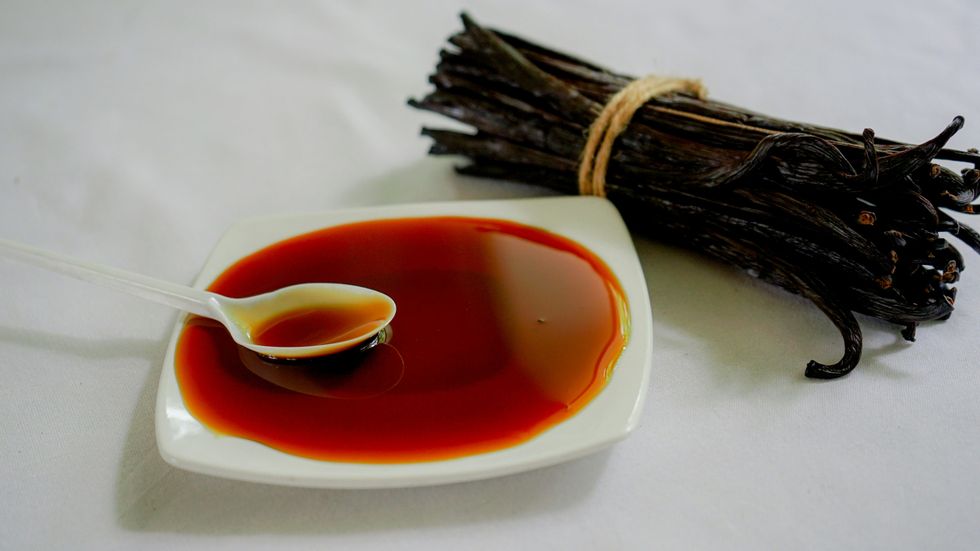
Unsplash
When it comes to holiday desserts, you’re going to be hard-pressed to find recipes that don’t include vanilla — and that alone explains why it is considered to be a traditional holiday scent. As far as your libido goes, vanilla is absolutely considered to be an aphrodisiac — partly because its sweet scent is considered to be very sensual. Some studies even reveal that vanillin (the active ingredient in vanilla) is able to increase sexual arousal and improve erectile dysfunction in men. So, if you adore the smell, here is more incentive to use it.
2. Frankincense
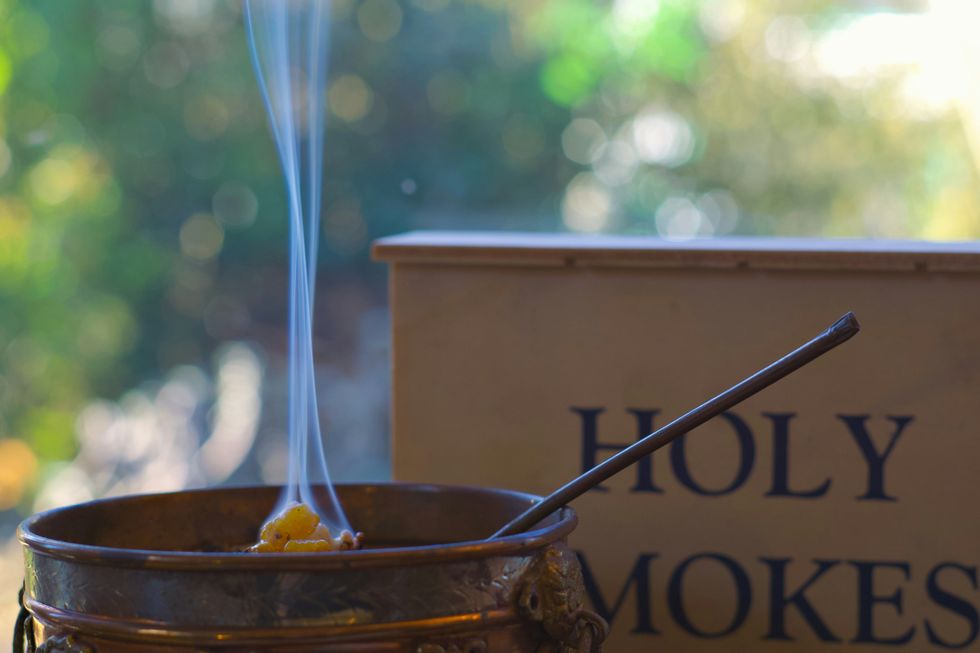
Unsplash
Although, typically, when people think about frankincense (and myrrh), it’s in the context of the gifts that the wise men brought Christ after he was born; it’s a part of the biblical Christmas story. However, frankincense goes much deeper than that. Sexually, since it has an earthy and spicy scent, some people like to use it to meditate (check out “What Exactly Is 'Orgasmic Meditation'?”). Also, since it has the ability to put you in a better mood, soothe and soften your skin and maintain your oral health — with the help of frankincense, every touch and kiss can be that much…sexier.
3. Cinnamon
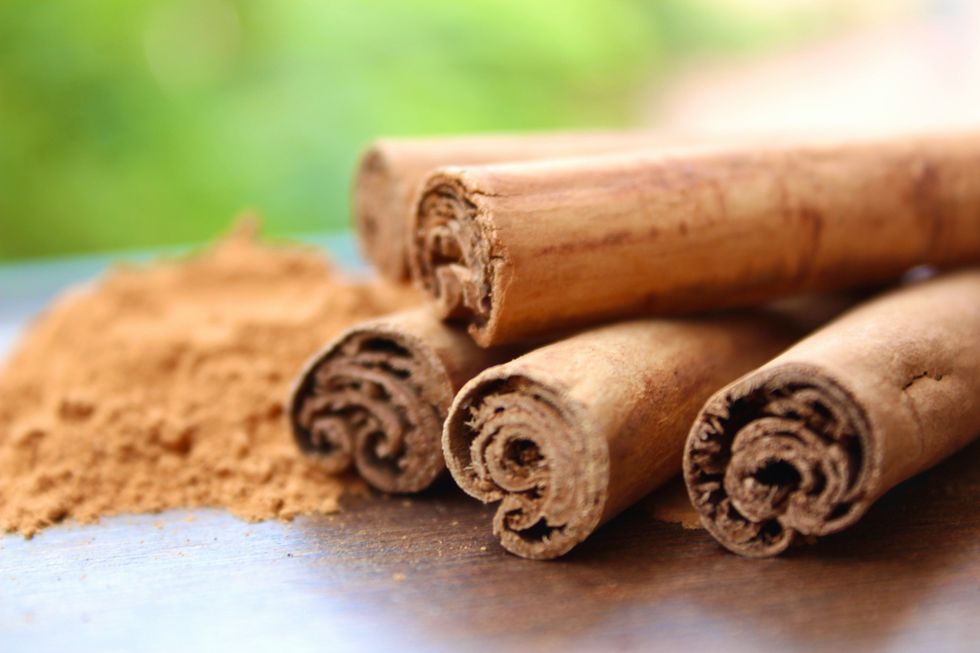
Unsplash
I already gave cinnamon a shout-out in the intro. Personally, I’ve been a fan of it, in the sex department, for a long time now (check out “12 ‘Sex Condiments’ That Can Make Coitus Even More...Delicious”). When it’s in oil form, it can be very sweet to the taste while sending a warm sensation throughout the body — which is why the giver and receiver of oral sex can benefit from its usage. Beyond that, cinnamon helps to increase blood flow to your genital region, elevate sexual desire and, some studies say that it can even help improve fertility. Beautiful.
4. Peppermint
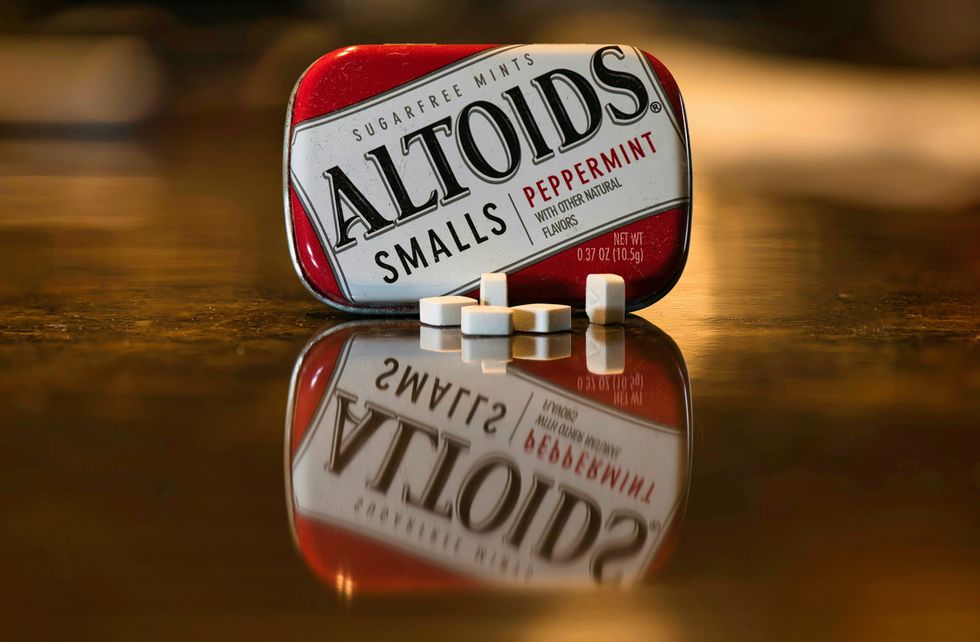
Unsplash
If there’s a signature candy for the holiday season, it’s probably a candy cane — which automatically puts peppermint in the running for being an official holiday scent. Pretty much, in any form, it’s got your sex life’s back because it’s hailed as being a sexual stimulant; in part, because its smell is so invigorating. Plus, it helps to (eh hem) ease headaches, it gives you more energy and it can definitely help to freshen your breath. Also, that minty sensation? The same thing that I said about cinnamon can apply to peppermint too (if you catch my drift).
5. Ginger

Unsplash
Whether it’s in a meal or in your bedroom, ginger is going to produce results that are hella spicy. On the sex tip, science has praised ginger for being able to increase sexual arousal, improve blood circulation (which intensifies orgasms) and strengthen fertility for many years. Scent-wise, I find it to be one that both men and women enjoy because it is both woodsy and sweet. So, if you’ve got some massage oil in mind, adding some ginger is a way to please you both.
6. Pomegranate

Unsplash
September through December is the time of year when pomegranates are considered to be in season. And, as someone who is a Rosh Hashanah observer, I have a personal adoration for them because I am aware of the various things that they symbolize in Hebrew culture including the fact that they are a fruit that represents love and fertility. So yeah, they would absolutely be an aphrodisiac — one that is perfect for this time of the year. While consuming it helps to boost testosterone levels in both men and women, the floral bittersweet smell that it produces can help to reduce stress while promoting relaxation (like most floral scents do) — and the more relaxed you are, the easier it is to climax.
7. Nutmeg
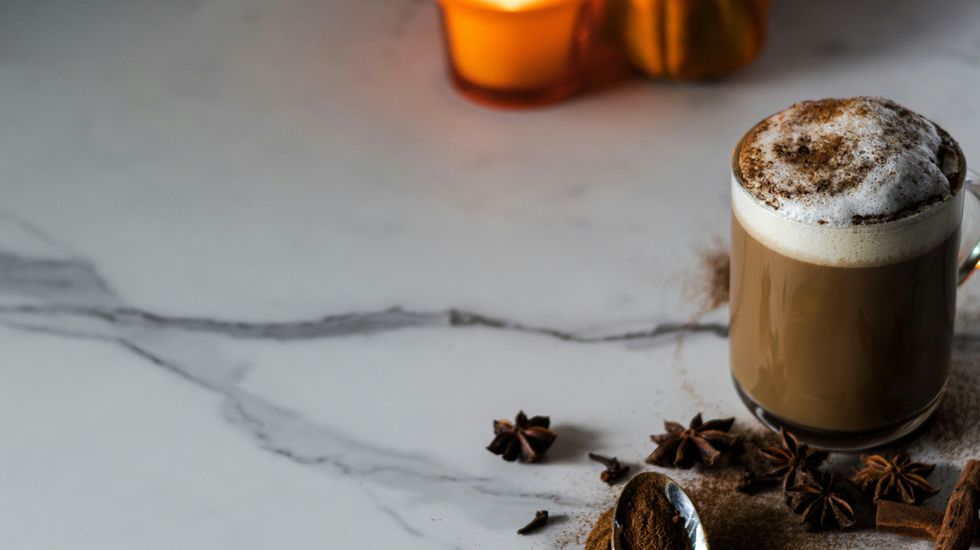
Unsplash
Another signature seasoning during the holiday season is nutmeg. It’s perfect in Thanksgiving sweet potato (or pumpkin) pie and Christmas morning French toast. And yes, it can also make your sex life better. If you consume it, it can intensify your libido and, overall, its warm-meets-spicy-meets-sweet smell is so inviting that it is considered to be a pretty seductive scent.
8. Cloves
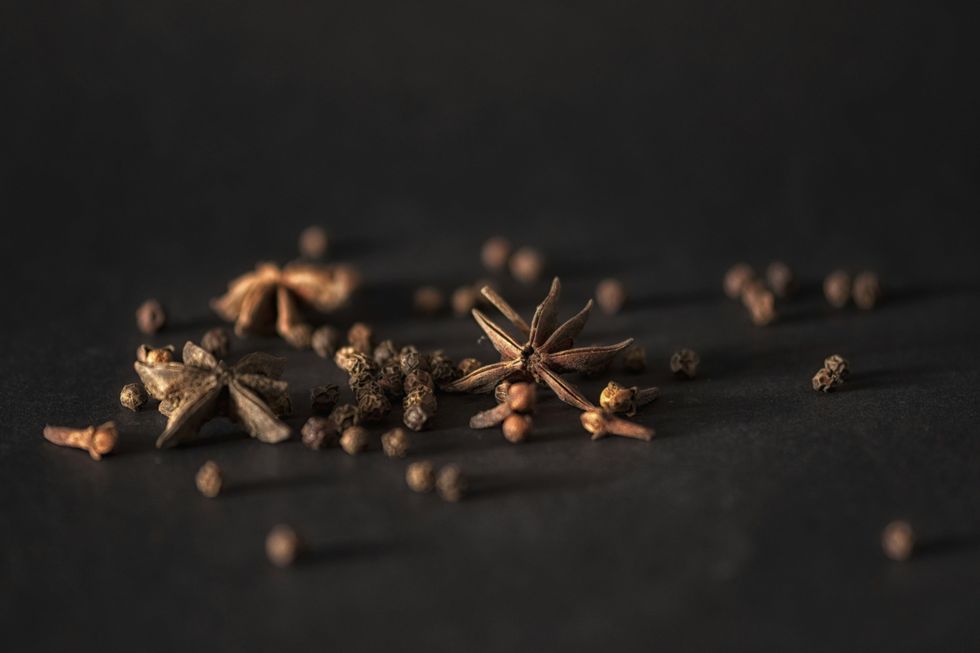
Unsplash
I ain’t got not one lie to tell you — if you’ve got a toothache, put some clove oil on that bad boy and send me a Christmas present for putting you on game. Aside from that, as I round all of this out, cloves are another holiday scent that can do wonders for your sex life. For men, it has the ability to significantly increase sexual arousal and improve stamina and endurance. For men and women alike, it also has a reputation for strengthening sexual desire. And for women solely? Well, if you want an all-natural way to increase natural lubrication down below — the scent and and feel (in DILUTED oil form) can make that happen. It can make the holidays especially special…if you know what I mean.
Ah yes — the atmosphere of the holidays and what it can do.
Take it all in! Scent ‘n whatever stimulating that comes with it! #wink
Let’s make things inbox official! Sign up for the xoNecole newsletter for love, wellness, career, and exclusive content delivered straight to your inbox.
Featured image by Giphy








